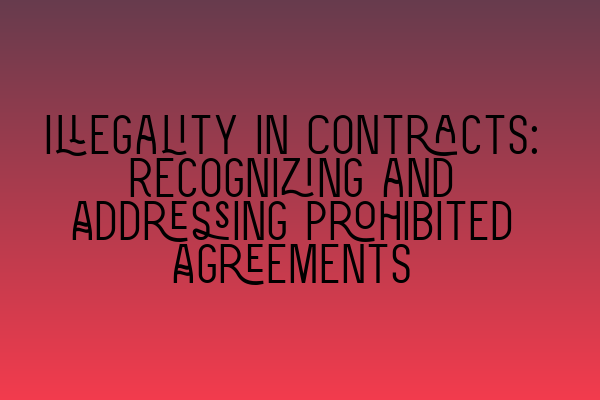Illegality in Contracts: Recognizing and Addressing Prohibited Agreements
Welcome to the SQE Contract Law blog, where we delve into the fascinating world of contract law and provide valuable insights and tips for legal professionals. In this blog post, we will explore the concept of illegality in contracts and discuss how to recognize and address prohibited agreements. If you are interested in mastering contract law and ensuring the legality of your agreements, keep reading!
The Basics of Illegality in Contracts
Illegality in contracts refers to agreements that are contrary to law or public policy. These agreements are considered void and unenforceable by the courts. It is crucial to recognize and address prohibited contracts to protect the interests of your clients and maintain the integrity of the legal system.
There are several types of prohibited agreements, including:
- Contracts Contravening Statute Law: These are agreements that violate specific statutes, such as contracts for illegal drug sales or contracts that breach consumer protection laws. It is essential to understand the relevant legislation to identify and avoid such contracts.
- Contracts Against Public Policy: These agreements are against public interest or public policy. Examples include contracts promoting criminal activities or agreements that seek to undermine the justice system. Courts are vigilant in striking down contracts that are contrary to public policy, and as legal professionals, we must be equally diligent.
- Contracts Tainted by Illegality: Even if a contract seems legal on the surface, it may become tainted by illegality if it is connected to or facilitates illegal activities. In such cases, the courts will refuse to enforce the agreement.
Recognizing Prohibited Agreements
Identifying prohibited agreements may not always be straightforward, as they may vary depending on jurisdiction and the specific circumstances of each case. However, there are some key indicators to watch out for:
- Contravention of Laws or Regulations: If an agreement violates existing laws or regulations, it is likely to be prohibited. Conduct thorough research and consult appropriate legal resources to ensure compliance.
- Public Policy Concerns: Consider the potential impact of the agreement on public interest and social values. If the agreement undermines public policy or has detrimental consequences, it may be prohibited.
- Association with Criminal Activities: Be wary of agreements linked to illegal activities or those that facilitate unlawful conduct. Courts are quick to identify and strike down contracts that enable or encourage criminal behavior.
Addressing Prohibited Agreements
If you encounter a prohibited agreement, it is crucial to address it promptly and appropriately. Here are some steps to consider:
- Advise and Inform: Educate your clients about the potential illegality of the contract and its consequences. Offer alternative solutions that comply with the law and public policy.
- Rectify or Amend: In some cases, it may be possible to rectify or amend the agreement to remove the illegal elements. However, consult with your legal team to ensure that the modified contract remains enforceable.
- Seek Legal Intervention: If the prohibited agreement cannot be rectified or amended, it may be necessary to seek legal intervention. Consult with experienced legal professionals who specialize in contract law to explore the best course of action.
Conclusion
Illegality in contracts is a complex concept that requires careful consideration and attention from legal professionals. By recognizing the various types of prohibited agreements and implementing proactive measures to address them, we can ensure the integrity and enforceability of contracts.
For further reading on related topics, we recommend the following articles:
- Navigating Legal Challenges and Pitfalls in Your Practice
- Barrister vs. Solicitor: A Comprehensive Comparison
- Exploring Different Solicitor Specializations: Finding Your Niche
- Top Recommendations for Law Schools in the UK
- Embracing the Rise of Virtual Law Practices
Thank you for reading this blog post on illegality in contracts. Stay tuned for more informative content from SQE Contract Law!
